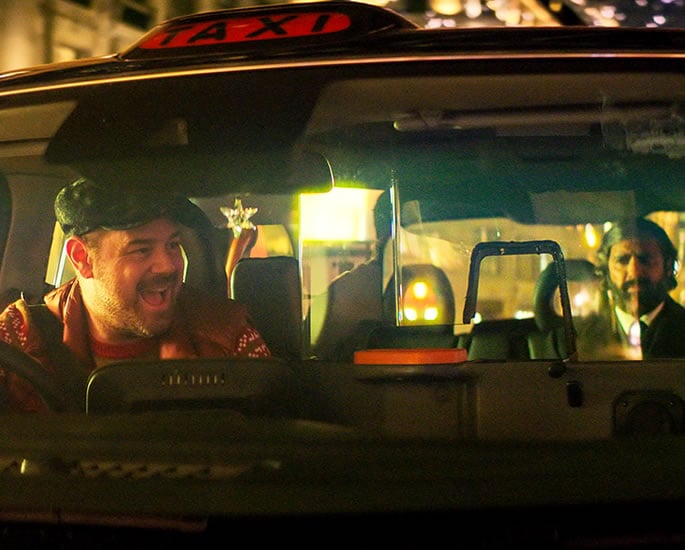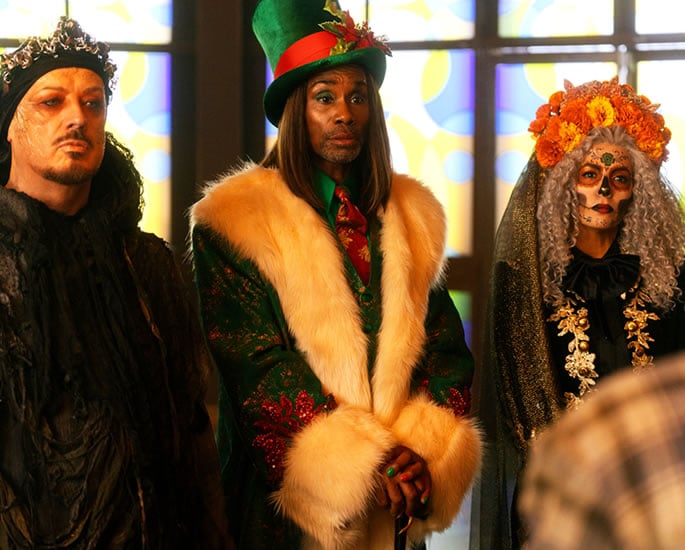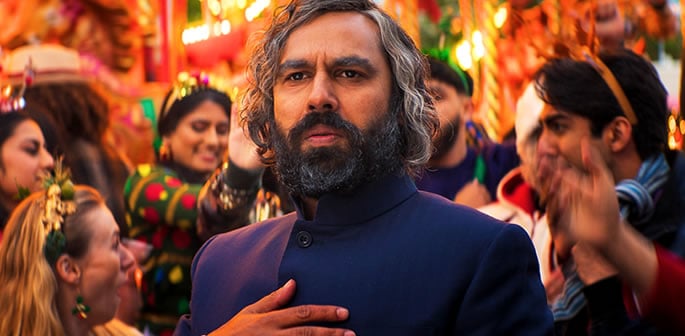this isn’t just a cultural remix; it’s a reckoning.
Gurinder Chadha’s Christmas Karma is a film that refuses to play it safe.
Chadha takes Charles Dickens’ A Christmas Carol and wraps it in a British Asian sensibility, a world where chilli tandoori turkey, bhangra beats, and gospel choirs replace traditional trimmings.
It’s a mix of faith, migration, and memory, told through a story that feels as political as it is personal.
This is no nostalgic rehash – Christmas Karma is a mirror held up to Britain’s multicultural soul.
And while it carries all the warmth of a Christmas movie, it also challenges viewers to reflect on the histories that shaped today’s South Asian diaspora.
A Story Reimagined Through Migration and Memory

At the heart of Christmas Karma is Mr Sood (Kunal Nayyar), a self-made businessman who’s become cold, bitter, and obsessed with wealth.
For him, money means respect, and compassion is a weakness.
But when he’s visited by three ghosts on Christmas Eve, including one who solemnly declares, “Man’s duty is to empathise with his fellow man”, his worldview begins to unravel.
In classic Chadha fashion, Dickens’ London is reborn in multicultural Britain. Yet this isn’t just a cultural remix; it’s a reckoning.
The Ghost of Christmas Past (Eva Longoria) drags Mr Sood back to 1972, during the expulsion of Asians from Uganda by Idi Amin.
These scenes, fuelled by real archival footage and Enoch Powell’s “Rivers of Blood” speech, are some of the most powerful Chadha has ever shot. They give the film emotional weight and historical urgency.
Through flashbacks, we see the death of Mr Sood’s father, his and his sister’s forced stay in an orphanage, and the racial hostility that defined his youth.
A violent attack by the National Front and rejection from his first love for not being “rich enough” leave deep scars.
It’s here that Christmas Karma truly shines, showing how trauma and migration shaped generations of South Asians long before the word “diaspora” became part of everyday vocabulary.
For many British Asians, this chapter of history has never been represented on screen.
Gurinder Chadha moves the conversation beyond Partition and into the lesser-seen realities of expulsion, racism, and resilience.
The film’s ghosts don’t just haunt Mr Sood; they represent collective memory – the pain and pride of a community constantly remaking itself.
Kunal Nayyar’s Career-Defining Turn

For Kunal Nayyar, best known for The Big Bang Theory, Christmas Karma marks a defining moment.
As Mr Sood, he delivers a performance that’s stripped of comedy and full of conviction.
His version of Dickens’ Scrooge doesn’t mutter “Bah humbug!” but instead spits “Bakwas!” – a line that’s both funny and painfully fitting.
Nayyar captures every layer of Mr Sood’s bitterness: the child who lost everything, the man who clings to wealth for validation, and the adult who believes generosity is for fools.
It’s a portrayal that feels deeply human, especially as the ghosts force him to confront the loss and prejudice he’s spent decades burying.
When Tiny Tim – reimagined as Mr Sood’s son’s young assistant battling cancer – enters the story, Mr Sood’s emotional thaw begins.
Nayyar plays this transformation with restraint, allowing compassion to seep in rather than burst out. It’s easily his most grounded and emotionally rich role to date.
Music That Moves the Story

Christmas Karma is a musical-inspired adaptation of Dickens’ story and with the likes of Gary Barlow, Nitin Sawhney, Panjabi MC and many more behind the soundtrack, the film pulses with rhythm and emotion.
From hip-hop and bhangra to church choirs and gospel, the songs propel the story forward.
Two lyrical lines stand out: “Don’t let the pain of the past define who you are” and “Don’t let the hate define who you are – rise up.”
Both perfectly capture the film’s call for healing and unity.
The bhangra scene featuring Malkit Singh and Danny Dyer is pure cinematic joy – infectious, colourful, and unapologetically celebratory.
It’s Chadha at her best: finding truth in joy, using rhythm as resistance. Even when the film navigates heavy themes, its music reminds us that celebration is survival.
Representation with Heart

Gurinder Chadha’s filmography has always blended humour and heritage, but Christmas Karma feels like her most mature and introspective work yet.
It celebrates British Asian identity not as an accessory, but as the backbone of the narrative.
She refuses to flatten the immigrant experience into clichés.
Instead, she honours the complexities – the struggle for belonging, the generational wounds, and the unspoken pride that comes with resilience.
In a season where British screens are often filled with snow-dusted villages and Anglo-centric tales, Christmas Karma dares to reimagine Christmas through a South Asian lens, complete with chilli tandoori turkey, church choirs, and ghosts who speak the truth.
The film’s emotional core lies in empathy.
As Mr Sood learns, wealth can’t erase pain, but compassion can bridge it.
Chadha reminds viewers that the spirit of Christmas isn’t about festivity alone; it’s about understanding one another’s struggles and finding humanity in shared stories.
Christmas Karma isn’t flawless as its tonal shifts can be uneven, and its mix of music and melodrama might not please everyone.
But its ambition, heart, and honesty make it essential viewing.
It bridges generations of South Asians, speaking to older viewers who recognise the struggles of migration and younger audiences seeking representation in familiar festive spaces.
The film is educational, entertaining, and filled with warmth.
Like every great Christmas story, it leaves you with a message worth remembering – one of compassion and empathy.
As the ghost of Jacob Marley (Hugh Bonneville) declares: “Mankind is my business. Man has a duty to empathise with his fellow man.”
That’s the true spirit of Christmas Karma: a film that asks us to see each other more clearly, dance through the pain, and carry empathy forward because that, perhaps, is the greatest Christmas gift of all.






























































